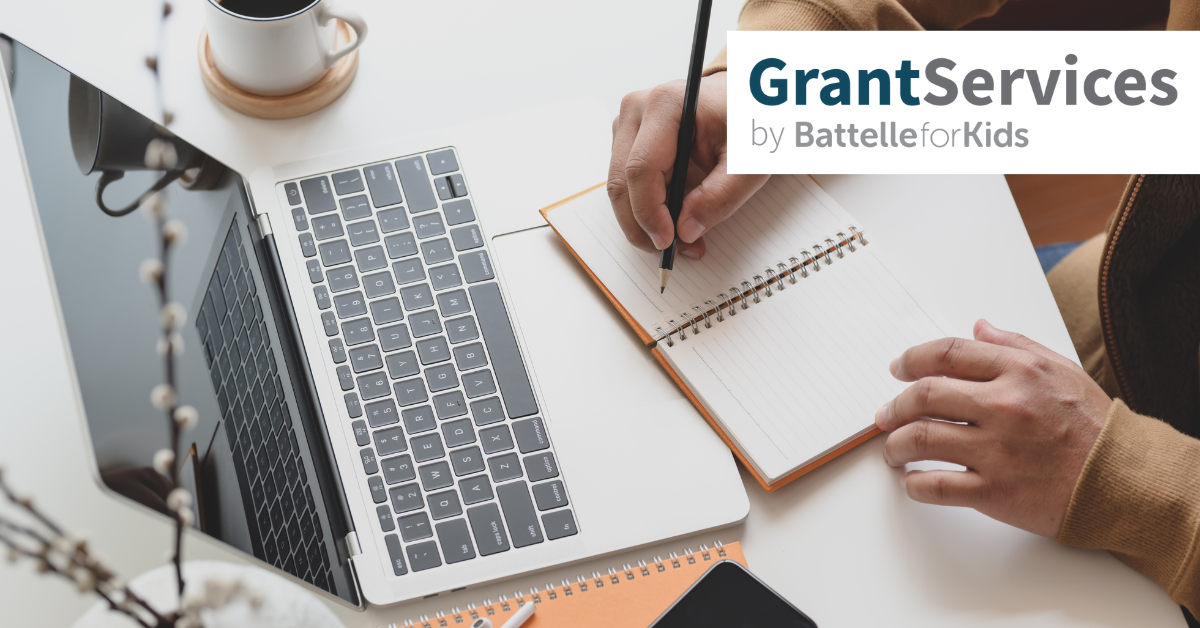There is no shortage of grant funding available for education programs. However, securing these grant funds can be challenging due to strong competition. It’s imperative that your grant proposal stand out above the rest, which requires a keen eye for details and a thorough understanding of all facets of the grant application process.
Battelle for Kids can help. Our experienced Grant Services team has partnered with educators to secure and manage more than half a billion dollars in grant funding.
We offer a wide range of support during the pursuit and after the award, including grant proposal, evaluation, management, and sustainability, as well as thought partnership and development for programmatic grants. Connect with us to learn more.
Or invest in your own professional learning by attending our upcoming Grant Writing Essentials workshop on April 24-25 in Salt Lake City. This intensive workshop is designed specifically for aspiring education grant writers and includes a year-long cohort experience to collaborate with educators from across the country.
To get you started writing winning grant proposals, here are five tips that the BFK Grant Services team has shared.
Tip #1: Explicitly follow the Request for Proposal guidelines.
Grantors will provide applicants with grant guidelines, often referred to as a Request for Proposal (RFP) or a Funding Opportunity Announcement (FOA). These guidelines must be followed with precision to increase your chances of getting funded.
Oftentimes, these grant guidelines will provide you with all of the specific criteria for how to put your proposal together and how to package it. If you miss one of these specific details, your grant application could be pushed aside or not read at all because you didn’t follow the grantor’s written instructions. This is often perceived by a grantor that you would not be a good manager of grant funds since you didn’t follow the written directions.
Tip #2: Know who will be reading your proposal.
Understanding who will be reading your proposal is paramount in knowing how much detail you must include in your proposal narrative.
At the foundation level of funding, a senior advisor or director who supervises the grant interest area is usually the person who reads the proposals. This is an individual you should build a relationship with while you write your foundation proposal to make sure they understand your ideas and concepts.
At the state and federal funding levels, grants are decided by a team of 2-3 peer reviewers who are subject matter experts in the field of study your grant will focus on. Sometimes state and federal agencies struggle to find enough individuals to serve as peer reviewers and may end up with individuals who work outside the purview of your proposal concept.
Tip #3: Carefully match your grant idea with an appropriate funding source.
Make sure you conduct a significant amount of research about your potential funder to ensure your grant idea is something they are interested in funding. This can be done in person, through email, or a phone call to discuss your idea and concepts with the funder prior to beginning the writing process.
Tip #4: Secure partners to support your grant efforts.
Securing partners and obtaining quality documentation of these collaborations is time-consuming when writing a grant proposal. But it will positively impact the fundability of a proposal.
It is important to present a “united front” demonstrating that your community is behind your grant concept and is willing to assist with implementing your identified grant initiatives. It is important to have these partners provide you with a signed Memorandum of Understanding or a Letter of Partnership that you can include with your grant request.
Tip #5: Align your grant proposal to the needs of the beneficiaries of the grant.
Grantors want to understand what the needs are of the beneficiaries of your grant project idea. Oftentimes, a grant writer will discuss what they want to buy with the money, instead of providing a statement of need, documented by recent data and statistics, supporting why the beneficiaries of the grant need the program or project that is being proposed.
Be explicit with what the need is and support it with relevant data.
–
If you’re looking for help with writing a grant proposal or managing an award you’ve already received, Battelle for Kids can help. Connect with us to learn more.
Learn more about our upcoming Grant Writing Essentials workshop specifically designed for K-12 school district leaders and educators.

